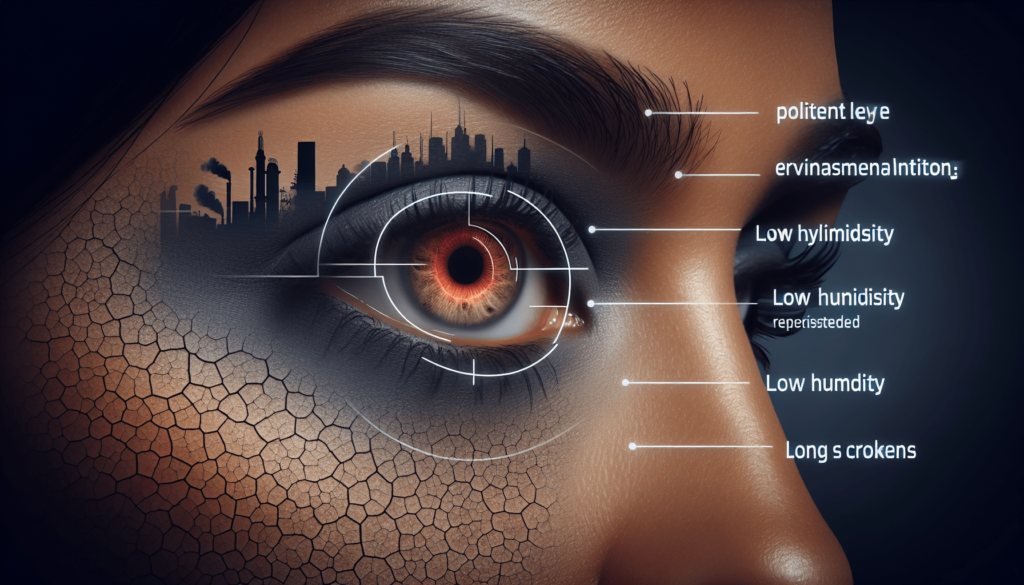Welcome to our article on common nutritional deficiencies that can lead to dry eyes. When your body doesn’t receive enough of certain key nutrients, it can impact the health of your eyes and cause discomfort. From vitamins to essential fatty acids, we will explore how deficiencies in these substances can contribute to dry, irritated eyes. By understanding the importance of proper nutrition for your eye health, you can take proactive steps to keep your eyes feeling comfortable and healthy. So sit back, relax, and let’s dive into the world of nutrition and eye health together.
What Nutritional Deficiencies Can Cause Dry Eyes?
Have you been experiencing the uncomfortable symptoms of dry eyes lately? Did you know that certain nutritional deficiencies could be the underlying cause of this issue? In this article, we will explore the common nutritional deficiencies that can lead to dry eyes and how you can address them to improve your eye health.
Understanding Dry Eyes
Before we dive into the specific nutritional deficiencies that can cause dry eyes, let’s first understand what dry eyes are. Dry eye syndrome occurs when your eyes do not produce enough tears or when the tears evaporate too quickly. This can result in symptoms such as itching, burning, redness, and a feeling of grittiness in the eyes.
Symptoms of Dry Eyes
Dry eyes can manifest in various symptoms, including:
- Itching or a gritty sensation in the eyes
- Burning or stinging sensation
- Redness in the eyes
- Blurred vision
- Sensitivity to light
- Difficulty wearing contact lenses
If you are experiencing any of these symptoms, it is essential to address the root cause, which could be related to your diet and nutritional intake.
Common Nutritional Deficiencies Linked to Dry Eyes
Several key nutrients play a vital role in maintaining eye health and preventing dry eyes. Here are some of the most common nutritional deficiencies that can lead to dry eyes:
Omega-3 Fatty Acids
Omega-3 fatty acids are essential fats that are crucial for maintaining the health of your eyes. These fatty acids have anti-inflammatory properties that can help reduce eye inflammation and improve tear quality. Incorporating omega-3 rich foods or supplements into your diet can help alleviate symptoms of dry eyes.
Vitamin A
Vitamin A is essential for maintaining healthy vision and tear production. A deficiency in this vitamin can lead to dry eyes and other vision problems. Consuming vitamin A-rich foods such as carrots, sweet potatoes, and leafy greens can help support eye health and prevent dry eyes.
Vitamin D
Vitamin D plays a crucial role in regulating the immune system and reducing inflammation in the body. A deficiency in vitamin D has been linked to various eye disorders, including dry eyes. Spending time in the sun and consuming vitamin D-rich foods can help maintain adequate levels of this essential nutrient.
Vitamin C
Vitamin C is a powerful antioxidant that helps protect the eyes from oxidative stress and inflammation. Adequate intake of vitamin C can help prevent dry eyes and other eye-related issues. Citrus fruits, berries, and bell peppers are excellent sources of vitamin C that you can incorporate into your diet.
Zinc
Zinc is a trace mineral that is essential for maintaining eye health and preventing dry eyes. This nutrient plays a crucial role in the production of tears and the function of the retina. Foods rich in zinc, such as oysters, beef, and pumpkin seeds, can help support optimal eye health.
Incorporating Nutrient-Rich Foods into Your Diet
Now that you are aware of the key nutrients that can help prevent dry eyes, it is essential to incorporate these foods into your daily diet. Here are some nutrient-rich foods that you can add to your meals to support healthy eyes:
| Nutrient | Food Sources |
|---|---|
| Omega-3 Fatty Acids | Fatty fish (salmon, mackerel, sardines), chia seeds, flaxseeds |
| Vitamin A | Carrots, sweet potatoes, spinach, kale |
| Vitamin D | Sunlight, fortified dairy products, fatty fish |
| Vitamin C | Oranges, strawberries, bell peppers |
| Zinc | Oysters, beef, pumpkin seeds |
By incorporating a variety of these nutrient-rich foods into your diet, you can help support optimal eye health and prevent dry eyes.
Supplementing with Nutritional Supplements
In addition to consuming a balanced diet rich in essential nutrients, you may also consider supplementing with nutritional supplements to ensure you are meeting your body’s needs. Here are some common supplements that can help support eye health and prevent dry eyes:
Fish Oil Supplements
Fish oil supplements are a convenient way to increase your intake of omega-3 fatty acids, which are crucial for maintaining eye health. Look for high-quality fish oil supplements that provide a good balance of EPA and DHA to support healthy tears and reduce eye inflammation.
Vitamin A Supplements
If you are unable to get enough vitamin A from your diet, you may consider taking vitamin A supplements to support healthy vision and tear production. Consult with your healthcare provider before starting any new supplement regimen to determine the appropriate dosage for your needs.
Vitamin D Supplements
If you live in a region with limited sunlight exposure or have a vitamin D deficiency, supplementing with vitamin D can help maintain optimal levels of this essential nutrient. Vitamin D supplements are available in various forms, including capsules and liquid drops.
Vitamin C Supplements
For individuals who may have difficulty meeting their vitamin C requirements through diet alone, vitamin C supplements can be a convenient option to support eye health and prevent oxidative stress. Be sure to choose a reputable supplement brand to ensure potency and effectiveness.
Zinc Supplements
Zinc supplements can be beneficial for individuals who have difficulty absorbing zinc from food sources or have increased zinc requirements. Consult with a healthcare provider to determine the appropriate dosage of zinc supplements based on your individual needs.
Lifestyle Changes for Healthy Eyes
In addition to addressing nutritional deficiencies and supplementing as needed, there are several lifestyle changes you can implement to promote healthy eyes and prevent dry eyes:
Stay Hydrated
Drinking an adequate amount of water throughout the day can help keep your body hydrated, including your eyes. Dehydration can exacerbate dry eye symptoms, so be sure to stay well-hydrated to support optimal tear production.
Practice Good Eye Hygiene
Maintaining good eye hygiene habits, such as avoiding rubbing your eyes, wearing protective eyewear, and taking regular breaks from screens, can help prevent dry eyes and reduce eye strain. Be mindful of your eye health and take steps to protect your eyes from environmental irritants.
Use Artificial Tears
If you are experiencing persistent dry eye symptoms, using artificial tears or lubricating eye drops can provide temporary relief and help keep your eyes moist. Be sure to choose preservative-free eye drops and follow the recommended usage instructions for optimal results.
Limit Screen Time
Excessive screen time can lead to digital eye strain and exacerbate dry eye symptoms. Try to take regular breaks from screens, practice the 20-20-20 rule (looking away from the screen every 20 minutes at something 20 feet away for 20 seconds), and adjust your screen settings to reduce eye strain.
Protect Your Eyes from UV Exposure
Prolonged exposure to UV radiation can damage your eyes and lead to dry eyes and other vision problems. Wear sunglasses with UV protection when spending time outdoors to shield your eyes from harmful UV rays and prevent eye damage.
By incorporating these lifestyle changes into your daily routine, you can help promote healthy eyes and prevent dry eyes from worsening.
Conclusion
In conclusion, addressing nutritional deficiencies and making healthy lifestyle choices are essential steps in preventing and managing dry eyes. By incorporating a variety of nutrient-rich foods into your diet, supplementing with essential nutrients as needed, and adopting good eye hygiene habits, you can support optimal eye health and alleviate dry eye symptoms.
If you are experiencing persistent dry eye symptoms despite making these changes, it is essential to consult with an eye care professional to determine the underlying cause and receive appropriate treatment. Taking proactive steps to support your eye health can help you enjoy clear vision and comfortable eyes for years to come.


